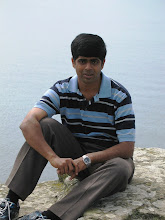BR C J HARRISON
In
1977 the people of Bajpe were
surprised to see a tall, gaunt Australian arrive to teach in St. Joseph’s. He had been born Cedric Harrison 53
years earlier, and when he joined the Christian Brothers in 1943, he had
been given the name Justinian - the Brothers always called him Jus. The people were quick to refer to him as
Kempanna, but with awe. Foreign he may
have been (the chillies in the food were always torture for him), but within a
few short months he was joining in the Konkani hymns in the Church, though they
were written in the Kannada script. Many
people thus realised that when Br. Harrison set out to communicate, nothing
could come in his way, and he would work very hard to make whatever climatic
and cultural adaptations he thought necessary.
As an Australian, it was not surprising
that he was very fond of sports. He was
an accomplished cricketer himself, and over the years, had trained students in
cricket, hockey and football : some of
them went on to be members of the Indian, (and Australian !) national
teams. St. Joseph’s quickly made a name
in Inter-District and Inter-State competitions, and remains a force to contend
with today !
He taught with the same energy and
focus. In order to help students to
learn the important aspects of English and Education which he taught, he
condensed the course material into pithy notes, and with the cooperation of the
Providence Press, turned them into booklets which were prized by students (and
teachers) all over the State. When his
name turns up in conversation people immediately refer to his handwriting. It was stunningly beautiful. And he spent hours working with students,
many of whom picked up his Copperplate style, and still continue to wow those
who see it. Br. Harrison was aware that
many of his students were bashful about their background - he
set out to inculcate a sense of self-esteem through competence in varied
fields. When he visited his family in
Australia, his descriptions of life in India prompted family and friends to
open their pockets, and hearts. He was
able to buy musical instruments, among other things, to enable him to teach
music.
But what people remember about him most of
all are not his talents, though they were many.
They remember a warm personality, a person who epitomised the gentle in
gentleman. Through crises and obstacles,
he was able to smile and encourage others to see the possibilities that were
hidden. It was not an empty optimism. He had evidently been carried through periods
of suffering by a God who loved him, and he longed to make that love known. Priests of the Diocese warmed to him ; Sisters of neighbouring communities sought
his advice ; Lions International valued
his presence. His generosity and
enthusiasm were such that two classes of students under the direction of Br.
Harrison and Br. Wilfred D’Souza carried the roof tiles for the first classroom
of Airport School (now Morning Star).
And he was a devoted correspondent.
The relationships that had been nurtured during the years that he
laboured in varied places, were continued with letters that those people
received for years afterward, in that meticulous hand.
In his last year, he was smitten by
leukemia, and his whole body was wracked by pain, while he rested in the
Brothers’ home in Goa. The Superior of
the community was Br. William D’Souza, one of Br. Harrison’s most fond alumni
(and whose handwriting leaves you in no doubt about that) They had many visitors during that year from
Bajpe. Through his pain he was an
inspiration to them all. It is not
surprising that the people of the parish concurred with Fr. Mathias, the parish
priest, when Br. Harrison died on the 19th of November 2008, that they would request the
Brothers to have him buried in Bajpe.
And so, the parish is blessed to have Br. Harrison for ever, long after the Brothers hand over the administration of St. Joseph’s institutions to younger people.
Mr. Arun D’Souza

No comments:
Post a Comment